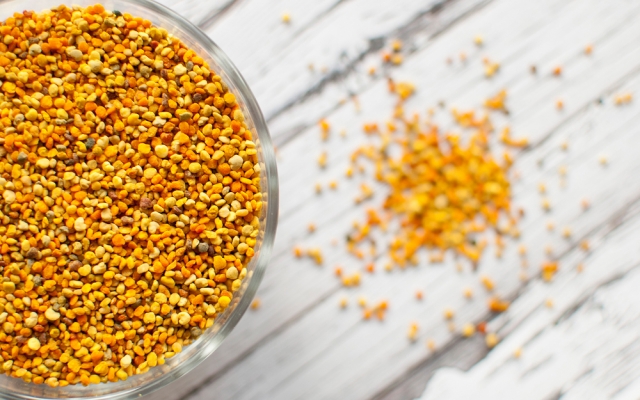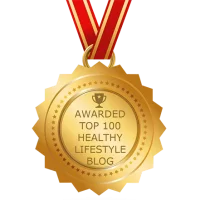Bee pollen is a natural food used as an holistic remedy throughout the world. It has been used in traditional Chinese medicine for many years as a fix for increasing energy, reducing cravings, improving digestion and building the blood iron stores in the blood. In this post, we’ll learn what bee pollen is, as well as the many health benefits of bee pollen.
What Is Bee Pollen?
Pollen is basically bee food. Bees collect pollen from flowering plants while they’re in search of nectar. Farmers then gather pollen granules from the bees’ legs via a small screened box attached to their hive. The result is a batch of small yellow nuggets that may be added to dishes for texture and nutritional value. Bee pollen is widely available for purchase online and in most health food stores.
Bee pollen is made by honeybees and is the food of the young bee. It is considered a superfood and one of nature’s most completely nourishing foods. Bee pollen is high in protein (approximately 40% protein), as well as other antioxidants, free amino acids, and vitamins, including B-complex and folic acid.
Pollen is a complete food as it contains nearly all nutrients required by humans. In fact, bee pollen actually contains many elements that products of animal origin do not possess. Bee pollen is richer in proteins than any animal source and it contains more amino acids than beef, eggs, or cheese of equal weight. Approximately half of the protein in bee pollen is in the form of free amino acids, which the body uses directly.
What are the Benefits of Bee Pollen?
Bee pollen contains all the essential components of life and many cultures throughout the world consider it an energy and nutritive tonic. Here are some great reasons to add fresh bee pollen to your daily diet:
- Energy Enhancer – The huge range of nutrients found within bee pollen makes it a great natural energizer. The carbohydrates, protein and B vitamins in bee pollen can help keep you going all day long by enhancing stamina and improving endurance and vitality.
- Improves Digestive Function – Bee pollen contains enzymes that can aid in digestion. Enzymes assist your body in getting all the nutrients you need from the food that you eat.
- Weight Control – Bee pollen works wonders in weight-control or weight-loss programs. The pollen stimulates the metabolic processes and can help speed calories burned.
- Immune System Booster – Bee pollen is good for the intestinal flora and thereby supports the immune system. According to holistic health expert Dr. Joseph Mercola, bee pollen has antibiotic-type properties that can help protect the body from contracting viruses. It’s also rich in antioxidants that protect the cells from the damaging oxidation of free radicals.
- Treats Allergies – Due to its powerful anti-inflammatory effects, bee pollen can ease inflammation and discomfort caused by asthma, hay fever, and allergies. Pollen reduces the presence of histamine, improving many allergies. Studies show that patients who took bee pollen orally became allergy symptom free. Pollen alleviated everything from asthma to allergies to sinus problems.
- Beauty Benefits – When you include bee pollen in your daily diet, it not only gives you the glow of health but it also helps to smooth, soothe, and rejuvenate your skin. The amino acids and vitamins protect the skin and aid the regeneration of cells. The skin becomes younger-looking, less vulnerable to wrinkles, smoother, and healthier.
- Supports the Cardiovascular System –Bee Pollen contains large amounts of Rutin; an antioxidant bioflavonoid that helps strengthen capillaries, blood vessels, assists with circulatory problems and corrects cholesterol levels. Its potent anti-clotting powers could help prevent heart attack and stroke.
- Infertility Problems – Some studies show that bee pollen and bee propolis can support estrogen formation, ovarian function and uterine lining health. If you do choose to use bee pollen for fertility in your preconception care routine, be sure to use a high quality product. Inform your healthcare provider before you start taking any supplements.
- Assists With Healing – Clinical research has shown that bee pollen applied to burn wounds reduces healing time of wounds and positively affects general health conditions. They also noted that pollen is a highly effective antimicrobial agent.
- Reduces Mast Cell Activation – Mast cells are part of the body’s innate immune system. When mast cells activate, they release chemicals that trigger allergic reactions. A study in Japan found that bee pollen significantly inhibited mast cell activation, thus minimizing allergic reactions. Bee pollen may also be helpful in treating Postural orthostatic tachycardia syndrome (POTS) since it is closely tied to Mast Cell Activation Syndrome.
How Should You Take Bee Pollen?
Bee pollen is a food and acts more effectively when taken at mealtimes and especially combined with fruit. Start gradually (½ tsp.) a day and work your way up to 1-3 tablespoons by the end of four weeks. Consider adding a spoonful of bee pollen at breakfast, preferably with a piece of fruit to enhance its effect.
If you think you might have sensitivity to pollen or a history of hay fever, try this simple test. Place a few granules in your mouth and wait 2 minutes. If you experience no symptoms (watery eyes, runny nose, sneezing), chew slowly and swallow. Wait another 24 hours and monitor your body for any symptoms. If you don’t experience any, gradually increase as stated above.
Always buy local to ensure you’re building up an immunity to the plants in your area. Ask your farmer, or look for a label that states it is mold and pesticide free. Choose a bottle with good color variety to make sure they come from different plants. This improves the bee pollen’s nutrient profile.
Store your fresh bee pollen in the refrigerator — sunlight and heat can destroy bee pollen’s nutrient value. It should keep well for up to a year if stored properly.
Important note: If you have a history of anaphylactic shock or are highly allergic to bee stings, it’s best to avoid bee pollen. Also, bee pollen may cause increased bleeding if taken with certain blood thinners like warfarin. If you’re pregnant, breast-feeding, or on blood thinners, please check with your doctor before consuming.





